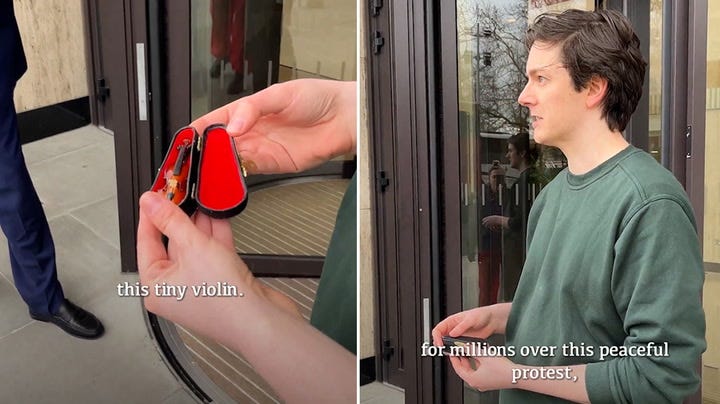TCC #67 — TotalEnergies accused of greenwashing, Greenpeace sends Shell a tiny violin
What's good and what's bad in the world of climate communications
Hi friends,
It’s a dark and weird time to be talking about climate communications. Between mass protests in the US and political upheaval elsewhere, it can feel inappropriate — or at least a bit on the nose — to talk about long-term problems like climate change, when short-term problems seem far more pressing. But Canadians are still breathing wildfire smoke, five Aussies died in catastrophic floods last month, and we just clocked the second-hottest May on record — so we can’t stop now.
This week, we’re testing out a new structure. We’ll share a few recent climate comms flops, a few wins, and a handful of links we think you’ll find interesting.
Let us know what you think about the new structure — we always love feedback.
This week’s briefing
❌ What’s bad
1. TotalEnergies faces greenwashing trial over natural gas
TotalEnergies is under legal scrutiny in France, accused by environmental groups of misleading consumers by promoting natural gas as an environmentally friendly transition fuel. In 2021, the company rebranded and publicised its goal to achieve carbon neutrality by 2050.
Yet in 2024, over 97% of the company’s total energy production was fossil fuels, and it only plans to expand oil and gas output in the future.
We’re beginning to see the cracks in the post-COVID hype that brought us all these flimsy corporate climate targets. Companies are now realising they can’t simply broadcast a climate target to keep up with their peers and then carry on with business as usual. The gap between what you say and what you do is the danger zone.
The problem is, for most big corporates, the pain of walking back climate targets is far less than the pain of doing the work to follow through on them. I believe the rollbacks we’ve seen in late 2024 and now in the first half of 2025 are just the beginning.
2. Pro-gas group in Australia accused of misleading claims
It seems gas has gotten a lot of people in trouble lately. "Australians for Natural Gas," a pro-gas organization with ties to the gas industry and the Liberal Party, is under investigation by the Australian Competition and Consumer Commission (ACCC).
Once again, cracks are appearing between how an organization presents itself (in this case, as a not-for-profit “representing the interests of Aussie households”) and why it actually exists (to keep its directors’ gas companies in business). Not to mention that it spread a whole lot of lies about fossil gas.
And once again, we are reminded of the core principle of good climate comms: just tell the truth. It’s cheaper than legal fees.
✅ What’s good
1. Greenpeace makes us laugh
I missed this when it happened, but I’ve recently learned about Greenpeace sending a model violin to the Shell HQ — a literal tiny violin for their tears over Greenpeace’s 2023 fossil fuel protest in the North Sea. We love to see humour in climate campaigns, especially when it’s as original and sassy as this. Even when faced with existential threats, Greenpeace doesn’t back down.
These are the kinds of climate comms we need to see more of: things that make headlines without alienating the majority (oil on Van Gogh, for example) or bogging people down in doom and gloom.
What we’re reading this week
📚 Book: Discriminations by A. C. Grayling — a meandering (sometimes frustratingly so) exploration of the history of cancel culture, in all its forms, and what it’s doing to our world today
📖 Article: “The most sustainable building is one too beautiful to tear down” — precisely. Why do North American architects go to Europe for inspiration, and then come home and build this? Why do we fawn over gorgeous old homes in magazines and then buy this? Maybe we’d make things last longer if we could actually stand to look at them.
🎤 Podcast: Jeffrey Goldberg + Kara Swisher on the Long-Term Consequences of Trump 2.0 — No one has had a better year than Jeffrey Goldberg. I think Goldberg is hilarious, and this exchange with Kara Swisher brings out the best in both of them, but it also offers some astounding insights into how Trump’s mind works. (Hint: it’s all about eyeballs — something the climate movement could learn from.)
What we’re working on
👉 A fleshed-out offer for our Mini Lead Generator blueprint that brings new leads to your sales pipeline every month, without the big lift that whitepapers and reports often demand.
Ways we can help 🫶
🎯 Need help building an organic lead-generating machine? → See our lead gen services
📥 Want to know what’s trending in the world of sustainability reporting? → Download our free PDF: 2025 State of Sustainability Reporting
📣 Share this with your climate tech marketing team




